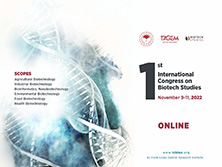Biotech Studies
2016, Vol 25, Num, 1 (Pages: 031-036)
Quality Potantials and Importance in Terms of Nutrition Physiology of Some Bread Wheat (Triticum aestivum L.) Varieties
2 Humboldt Üniversitesi, Yaşam Bilimleri Fakültesi, Albrecht Daniel Thaer Enstitüsü, Berlin-Almanya DOI : 10.21566/tarbitderg.280110 - Bread wheat (Triticum aestivum L.) ranks first in agricultural production in the world and our country that remains particularly important in human nourishment. In this study, bread making quality, dough properties and nutritional physiology features were examined in order to determine quality potentials of 15 bread wheat varieties which are grown in Aegean region and different ecological conditions in Turkey. According to obtained results; protein content 10.7-18.7%, starch amount 56.4-65.2%, gluten content 26.7-33.5%, sedimentation amount 19-31 ml, falling number 283-404 s and water absorption rate %58.8-69.3 values were obtained from analyzed parameters. Total antioxidant activity analyzed due to DPPH radical scavenging method and values of varieties changed between 11.89-26.33%. Besides the results obtained from sulphurous aminoacids ranged between methionine 0.22-0.37 g/100 g and cystine 0.494-0.706 g/100 g in whole grain flour. In terms of this study, importance of quality potentials and nutrition physiology of bread wheat varieties which are commonly grown in our country is revealed also it is aimed that considering the features examined in this study for quality and breeding studies in the future. Keywords : Bread wheat, quality, antioxidant, amino acid
















